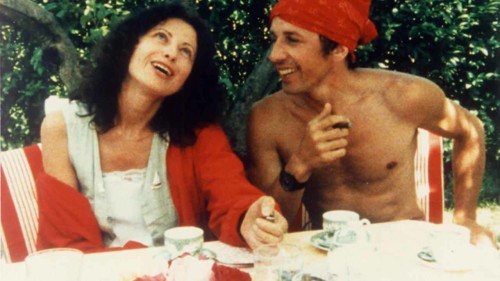I haven’t seen a movie directed by Noah Baumbach since The Squid and the Whale, a film that made me hate every critic who praised it and made me mistrust any person who said, “I liked it.” For the past decade he has been one of the filmmakers whose career infuriates me; his output makes me think of all the more deserving work (much of it from women) which hasn’t been funded
I first took notice of Greta Gerwig when she was in the execrable Whit Stillman film Damsels in Distress. Although I walked out at the halfway point of a preview screening (past a standing figure in the dark by the doorway whom I now recognize was Stillman himself). I could see Gerwig’s talent underneath the ridiculously mannered dialogue and stilted action. I didn’t expect Gerwig and Baumbach together to create in the second film (Frances Ha was the first) the two offscreen romantic partners have written in which Gerwig plays the lead and Baumbach directs, a movie that (in spite of its terrible title) is one of the delights of this summer: Mistress America.
The protagonist, Tracy (played by Lola Kirke: sister of Girls’ Jemima Kirke: I wondered why she looked so familiar) is in her first semester at Barnard in New York City and is having trouble finding the fun and stimulation college life–and New York–is supposed to be brimming with. Her dorm-mate alternates between chastising her and making fun of her (much more realistic than Boyhood‘s dorm-mate, embarrassed but politely deferential when she walked into her own room and found her roommate’s brother in bed with his girlfriend) and Tracy falls asleep in one of her literature classes–which leads to her making her first college friend, Tony (Matthew Shear) who surreptitiously wakes her. The two of them share writing ambitions and commiserate over screwdrivers in his room when they both have stories rejected by the campus literary magazine. But when he gets a girlfriend, Nicolette (Jasmine Cephas Jones) Tracy finds herself alone again, and her mother suggests she call Brooke (Gerwig) the 30-year-old daughter of the man the mother is engaged to marry.

Brooke meets Tracy in the chaotic, tourist-ridden Times Square where Brooke has an apartment. She explains,”I got off the bus from Jersey. I thought this was the cool place to live.” The two have a night that is full of everything Tracy feels she’s been missing: they first have a good, cheap, dinner, get backstage passes for a band who invite Brooke to join them onstage (she makes out with the bass player at the afterparty while Tracy looks on). Brooke and Tracy dance and talk, not about boyfriends (except very briefly) but about their own ambitions: Brooke cobbles together a living with interior decorating, a little tutoring and as the teacher of a spin class, but she also has concrete plans to open a restaurant. After that first night (when Tracy crashes on the couch in Brooke’s apartment) they spend time together throughout the semester, which helps Tracy come out of her shell.
Brooke doesn’t just have cool friends and know the right places to go (not to mention the savvy to find a place in the middle of Times Square where she can live by herself for not much money) but is also hilariously, gloriously opinionated. When she’s caught on camera kissing the band’s bass player she says, “Must we document ourselves all the time? Must we?”
When an old high school classmate confronts Brooke in a bar about her treatment of her when they were younger, Brooke is dismissive, saying that she doesn’t care what the woman thinks of her–and the woman shouldn’t care either. In the middle of a confrontation between Tony, a jealous Nicolette and Tracy, Brooke says, “There’s no cheating when you’re 18, you should all be touching each other all the time.”

Tracy writes the title short story, revolving around a very lightly fictionalized Brooke, “Claudia” which contains some truths that Tracy would never say to her face, an interesting development considering Baumbach wrote The Squid and The Whale about his own parents–and his portrait of them was not a flattering one. But Tracy’s story seems far too knowing and polished for an 18-year-old college student to have written: Gerwig and Baumbach missed an opportunity to parody a faux-sophisticated writing style as we hear Tracy read parts of the story as the film’s voiceover. Tracy also becomes less hesitant to express her opinions off the page: before she met Brooke , when Tony asked for “notes” on his story she had none, though he had plenty of suggestions for hers. Afterward she tells him he should stop trying for humor in his writing, because he doesn’t have a sense of humor in real life. At a later point he says to her, “You used to be so nice,” reminding us that, especially in describing young women “nice” is another way of saying “unformed”, “overly polite” or “afraid to say what she’s really thinking.”
I kept waiting for this film to go terribly wrong. The movies in which a younger man gloms onto an older one as an inspiration or role model usually show the older man has some great flaw, and free-living, fun women like Brooke in films (not just narrative ones) are usually punished, so I wondered if she would turn out to be a compulsive liar (since a lot of what she claims seems to be far-fetched) a drug addict or would have an untreated bipolar disorder and we would see her depressive side of in the latter half of the film. But Brooke’s downfall (which is more like a reckoning) doesn’t lie within herself but within the changes New York and other large cities have undergone in the past two or three decades. At one time someone like Brooke could make her way with nothing but ideas and ambition, but now young creative types and the places they like to hang out are at the mercy of the very rich, the only people who can afford to live in great swaths of those cities. The real-life restaurant where Brooke and Tracy have their first dinner closed one of their locations, unable to make a profit in today’s high-rent Manhattan.
Gerwig has, with Baumbach, written a role that she was born to play: her slightly spacy delivery serves as a disguise for Brooke’s razor-sharp observations. When a wealthy patron tells her that she’s funny and doesn’t know it, she corrects him, “”I know I’m funny. I know everything about myself.” But the real revelation here is Lola Kirke, who, as Tracy, starts off unsure of herself but accrues confidence at a record pace. In some ways, Tracy, with her brown shoulder-length hair in bulky, unflattering, outdated sweaters (which may be Baumbach reaching back to his own college years, the way the soundtrack includes familiar ’80s synth pop) is much more ordinary and natural than the young women we’re used to seeing in film but when she smiles and her eyes gleam at her newfound naughtiness, she burns a hole in the screen.
By the end both women have come into their own in a way films rarely acknowledge women do: the closest example I can think of is An Education but the focus in that film was on only one character. I would have liked to see this film explore the characters’ sexuality a little more: Tracy says (in the voiceover) that she’s “so in love” with “Claudia” and their chemistry together does seem to teeter to the non-platonic, though they never even kiss. Still I can’t complain when not just one but both of the main women characters end up single—and happy in their independence. When you leave the theater you’ll be smiling too.
[youtube_sc url=”https://www.youtube.com/watch?v=6z8MCW16uZY” iv_load_policy=”3″]
___________________________________________________
Ren Jender is a queer writer-performer/producer putting a film together. Her writing, besides appearing every week on Bitch Flicks, has also been published in The Toast, RH Reality Check, xoJane and the Feminist Wire. You can follow her on Twitter @renjender





